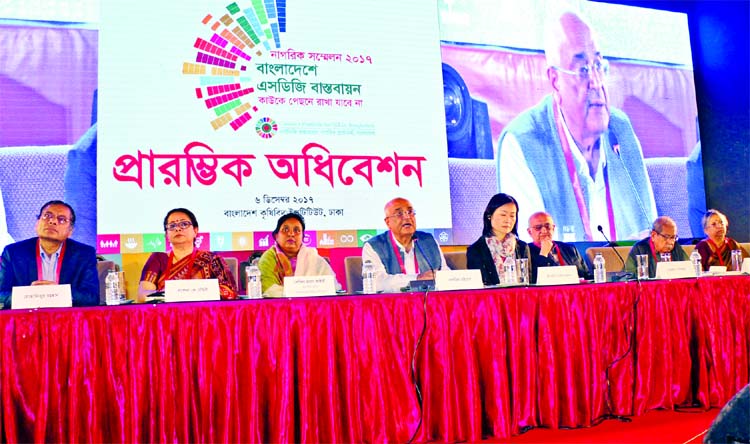
UNB, Dhaka :
Speakers at the “Citizen’s Conference on SDGs in Bangladesh” have urged the government to ensure its partnership with private sector, civil society and NGOs to implement programmes to achieve the sustainable development goals, set by the United Nations.
“Setting specific goals, identifying groups and actions through a collaboration between the government, civil society, private sector and NGOs will be the biggest challenge for SDG implementations,” said Prof Rehman Sobhan, eminent economist and chairman of Centre for Policy Dialogue (CPD), while addressing the conference at the auditorium of Krishibid Institute, Bangladesh (KIB) in the city on Wednesday.
Citizen’s Platform for SDGs, Bangladesh (CPSB), a newly formed organisation, organised the conference with CPD Fellow Dr. Debapriya Bhattacharya in the chair.
Prof Emeritus Anisuzzaman, Executive Director of Ain o Salish Kendra Sultana Kamal, former advisor of caretaker government Rasheda K Chowdhury, CPD executive director Prof Mustafizur Rahman, Narayanganj City Corporation Mayor Selina Hayat Ivy, former president of Dhaka Chamber of Commerce and Industry Asif Ibrahim and UNDP acting country director Kyoko Yokosuka also spoke on the occasion.
CPSB leaders said, they have organised the conference being inspired by the UN commitment to ‘Leave no one behind’, to create mass awareness about the SDGs in Bangladesh, develop more clarity and cohesion among the NGOs in its implementation process and explore further opportunities for government – NGO partnership in the country. Prof Rehman Sobhan said, “We want to send a message for the government to come together with the civil society. We are both the servant of 160 million people”.
He said working out appropriate actions, distribution of organisational responsibilities and ensuring their accountability will be another challenge for achieving SDGs.
Prof Anisuzzaman said that human society has achieved many successes in science and technology over the years but at the same time, many people still don’t have access to pure drinking water and medical service.
“The torture on Rohingya people has been the biggest example of human repression,” he said adding the biggest sadness is that most of the world wealth is captured in the hands of only few people which we cannot accept.
Speakers at the “Citizen’s Conference on SDGs in Bangladesh” have urged the government to ensure its partnership with private sector, civil society and NGOs to implement programmes to achieve the sustainable development goals, set by the United Nations.
“Setting specific goals, identifying groups and actions through a collaboration between the government, civil society, private sector and NGOs will be the biggest challenge for SDG implementations,” said Prof Rehman Sobhan, eminent economist and chairman of Centre for Policy Dialogue (CPD), while addressing the conference at the auditorium of Krishibid Institute, Bangladesh (KIB) in the city on Wednesday.
Citizen’s Platform for SDGs, Bangladesh (CPSB), a newly formed organisation, organised the conference with CPD Fellow Dr. Debapriya Bhattacharya in the chair.
Prof Emeritus Anisuzzaman, Executive Director of Ain o Salish Kendra Sultana Kamal, former advisor of caretaker government Rasheda K Chowdhury, CPD executive director Prof Mustafizur Rahman, Narayanganj City Corporation Mayor Selina Hayat Ivy, former president of Dhaka Chamber of Commerce and Industry Asif Ibrahim and UNDP acting country director Kyoko Yokosuka also spoke on the occasion.
CPSB leaders said, they have organised the conference being inspired by the UN commitment to ‘Leave no one behind’, to create mass awareness about the SDGs in Bangladesh, develop more clarity and cohesion among the NGOs in its implementation process and explore further opportunities for government – NGO partnership in the country. Prof Rehman Sobhan said, “We want to send a message for the government to come together with the civil society. We are both the servant of 160 million people”.
He said working out appropriate actions, distribution of organisational responsibilities and ensuring their accountability will be another challenge for achieving SDGs.
Prof Anisuzzaman said that human society has achieved many successes in science and technology over the years but at the same time, many people still don’t have access to pure drinking water and medical service.
“The torture on Rohingya people has been the biggest example of human repression,” he said adding the biggest sadness is that most of the world wealth is captured in the hands of only few people which we cannot accept.

